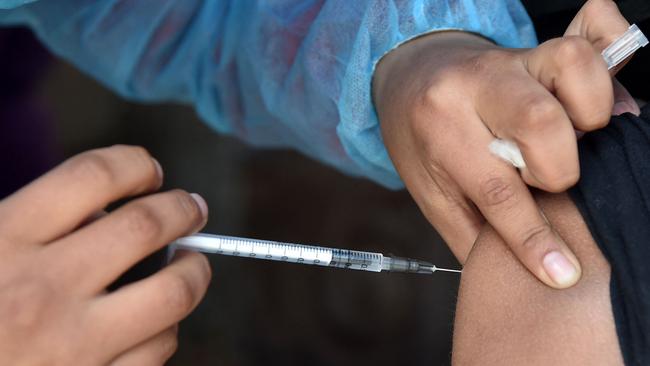Covid surge: What you need to know to protect yourself
Two new vaccines will soon be available in Australia to help fight new strains of Covid. See who is eligible and what else you can do to prevent infection.
Health
Don't miss out on the headlines from Health. Followed categories will be added to My News.
There are fears some corners of Australia may be headed for another Covid Christmas as case numbers surge.
More than 10,000 Australians reported contracting Covid in the last seven days but the true figure could be much larger as it is no longer a requirement to lodge a positive test with a person’s state.
The promoted a return to mask wearing in some settings.
On Monday, it was revealed two new Covid vaccines would soon be available in Australia to help fight new strains of the virus.
The Moderna and Pfizer XBB1.5 vaccines were approved by ATAGI, the Australian Technical Advisory Group on Immunisation, on Monday, and has been accepted by the federal government.
Here’s what you need to know about how to best protect yourself from Covid in the lead up to Christmas.
WHY YOU SHOULD GET THE NEW VACCINES
New data has revealed on 1.9 million Australian adults received a Covid vaccine in the six months to November 6, with only 5.5 per cent of Australians aged 18 to 64 getting a jab in that time.
People vaccinated with the new XBB1.5 shots had an 8.7 to 10.4 times increase in fighting the new Omicron subvariant and other recently circulating subvariants 29 days after receiving a dose.
“Vaccination reduces the risk of serious illness and death from Covid-19, particularly for older adults and those who are immunocompromised,” Mr Butler said.
“While we are no longer in the emergency phase of this pandemic, Covid-19 is still present, and people should continue to follow the advice of the experts from ATAGI, including getting vaccines as required.”
WHAT ARE THE NEW VACCINES?
Most of the Covid variants circulating in Australia are Omicron sub-lineages XBB. 1 and BA. 2.8, which is representing a small but growing proportion, according to a statement issued by the federal health department.

These new vaccines will be targeting these latest subvariants.
“These new vaccines will help protect Australians against current strains of Covid-19 and demonstrate the Government’s ongoing commitment to provide access to the latest and most effective vaccines,” Health Minister Mark Butler said.
WHO CAN GET THE NEW JABS
Pfizer’s vaccine will be available for use in eligible people aged five and older, while the Moderna vaccine can be used for those aged 12 and older.
Australian adults are recommended to get the initial two-dose Covid vaccine eight weeks apart.
People aged over 65 or with additional health issues are urged to get a booster every six months.
The 2023 dose may be considered for otherwise healthy adults on an individual risk-benefit assessment.
For people who have had their 2023 Covid-19 vaccinations, they do not need to get vaccinated again and will remain protected against severe disease from Covid-19.
WHEN WILL THEY BE AVAILABLE?
The two new vaccines will be available from December 11 and are now available to order by eligible providers.
SHOULD YOU WEAR A FACE MASK?
A number of Australian states have recommended people start wearing masks again.
In Western Australia, masks have been made mandatory in high-risk areas of public hospitals, while they’ve similarly been reintroduced in healthcare settings in other parts of the country.
In other states including NSW, Victoria, South Australia and Queensland it’s recommended you should consider wearing a mask:
- If you’re vulnerable (at higher risk of disease);
- If you’re diagnosed with Covid or have symptoms of an acute respiratory infection;
- If you’re a close contact
- Where requested by someone inside their home
NSW Health has warned Sydney could be facing a “Covid Christmas” for the third year in a row, while in Queensland there are rising expectations face masks could again be enforced in certain settings by Christmas.
– with NewsWire
More Coverage
Originally published as Covid surge: What you need to know to protect yourself




